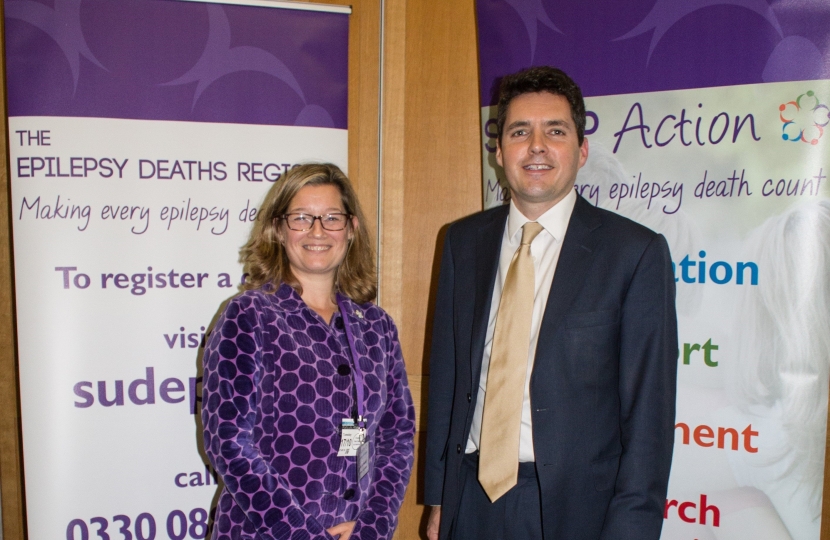
Local MP, Huw Merriman, has called for more action in Parliament to support constituents whose lives have been adversely affected by epilepsy.
Huw first attended a meeting on sudden unexpected death in epilepsy (SUDEP) with his constituent Michelle Samuel of Heathfield, an active supporter of the charity ‘SUDEP Action’. Michelle became a supporter of the charity following the sudden death of Diane, her younger sister, who died following an epileptic seizure.
Each year, 600 British people die suddenly from epilepsy – more than four times the number of babies who suffer cot death. It is estimated that over 40% of these deaths are preventable.
The charity was in Parliament to raise awareness of the issue and to announce that two million euros have been granted from the European Research Council (ERC) to carry out research towards the creation of a tiny wearable device that resembles a necklace which could save the lives of hundreds of young people each year.
The choker-style gadget, which is worn around the neck at night, alerts a nearby parent, partner or friend that their loved-one is suffering from a life-threatening event, such as a pause in their breathing or a change in how their heart beats.
Bereaved families from the charity hope it will prevent others from suffering the nightmare of losing a child or loved one.
Huw said “I attended the SUDEP Action meeting in Parliament with Michelle who I have worked with locally to highlight this cause. Her personal experience of losing a sibling has made me determined to work hard to raise awareness amongst fellow MPs, health professionals and those living with epilepsy. Increased knowledge is vital in preventing unnecessary deaths.”
Those most at risk from sudden death in epilepsy are young people aged between 20 and 40, and include those who leave home for college, university or work, and women who stop epilepsy medication during pregnancy. It was this latter group of women who the MP was supporting later in the same day. Speaking in a debate on the number of birth defects which have occurred as a result of pregnant women continuing to take prescribed drugs to control their epilepsy, the MP called for more to be done to ensure women are aware of the increased risks.
Having been contacted by his constituent Carol Short of Bexhill, the MP has called for all GPs to explain the increased risk of birth defects to epileptic women from the drug (Sodium Valproate). Ms Short had explained to the MP that she had used the drug to control epilepsy but it had affected the health of her unborn child. Carol explained to Huw that her son, now a 26 year old man, has severe learning difficulties and autism as a direct result of her taking the drug during pregnancy.
Miss Short is a member of the campaign group who are calling for greater awareness of the risks of sodium valproate amongst health professionals and women of child-bearing age. They are also calling for a public inquiry as to why it took so long for clear guidance to be issued when the risks were known since the 1970s. Epilepsy Action advises that women taking sodium valproate medicine for their epilepsy do not stop taking it unless advised to do so by their doctor. This is because they could be at risk of breakthrough seizures. The charity advises anyone worried about this medicine to speak to their doctor.
Speaking after the debate Huw said “I am grateful to my constituents for sharing their personal experiences with me which I was able to reference in the House of Commons debate. Whilst epilepsy is a condition many have to live through, many of the number of sudden deaths and birth defects are preventable. It is vital that Parliament uses its voice to make people aware of the good which can be done to prevent these tragedies from occurring.”



